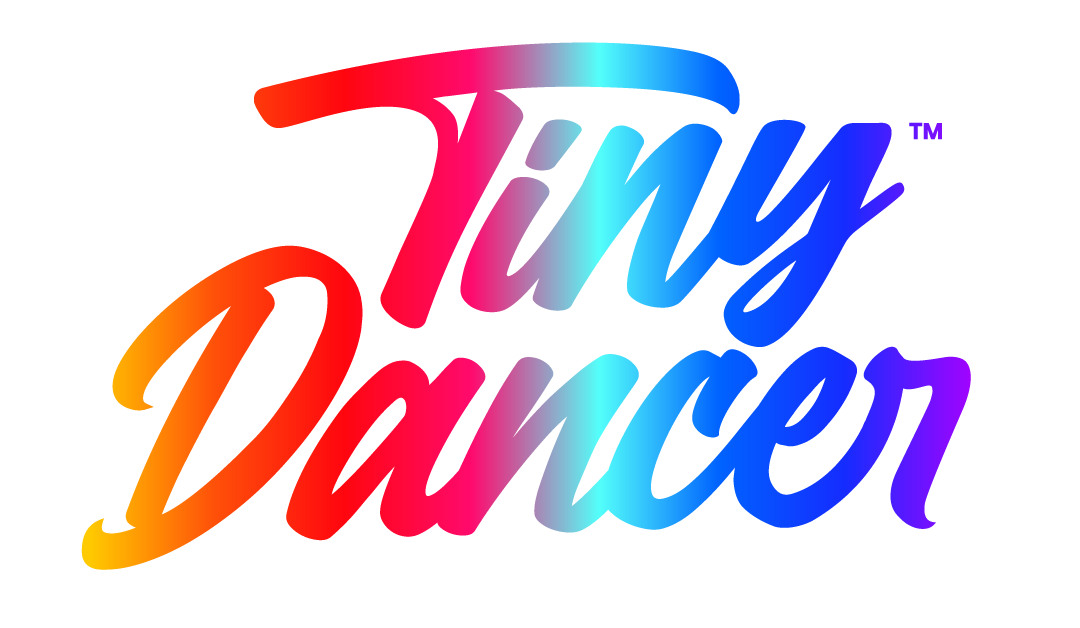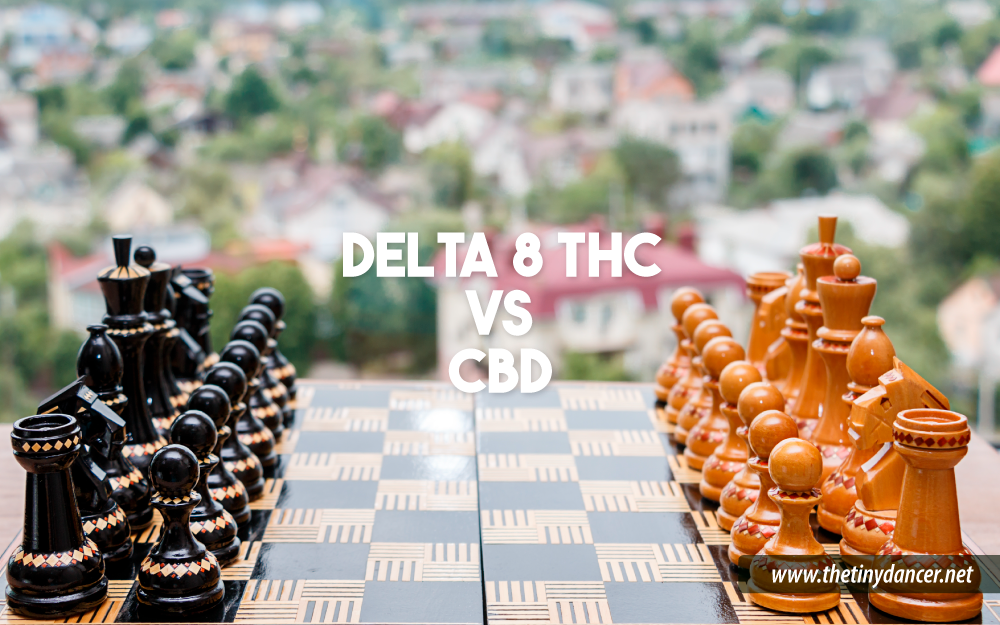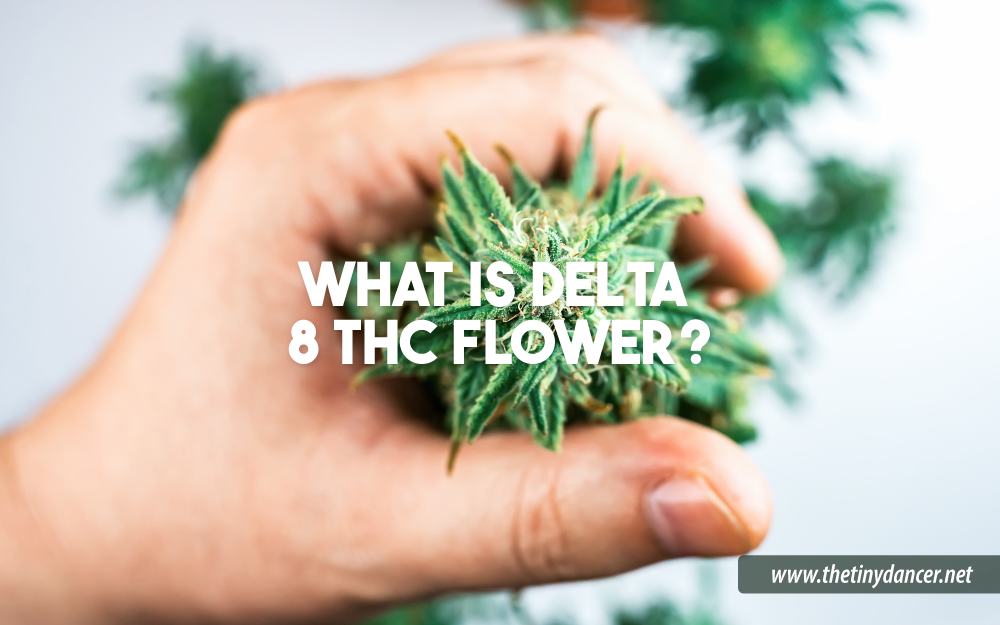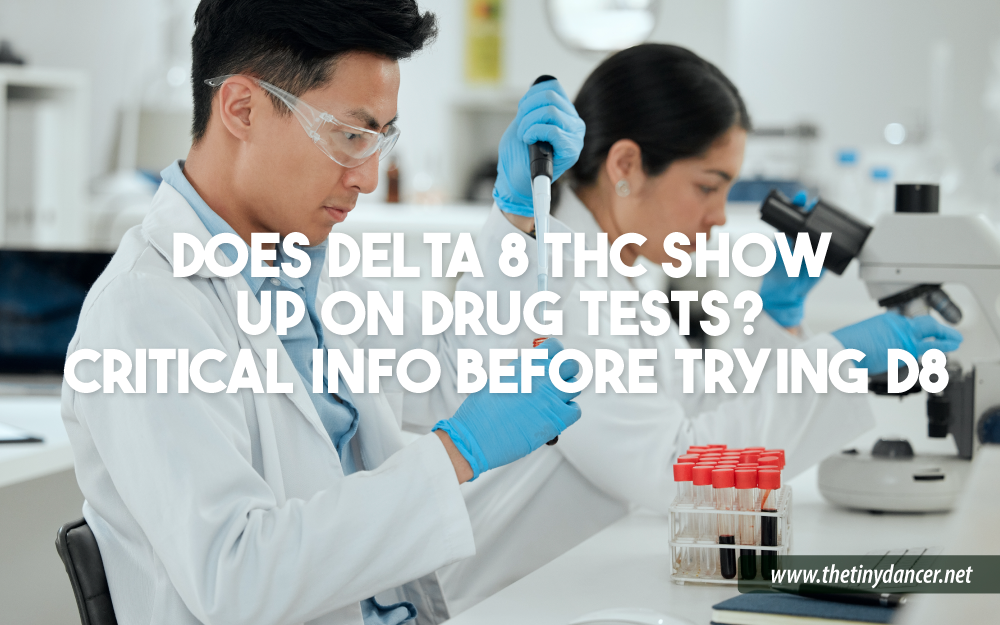The latest innovative product from the cannabis industry, Delta 8 THC, has rampant popularity among users. Yet, some questions remain. How different is Delta 8 THC from CBD?
Both Delta 8 THC and CBD are cannabinoid compounds found in cannabis. However, some significant differences between CBD and Delta 8 THC lie in their molecular structure, their effect on the body, and the depth of studies done on each chemical.
Since Delta 8 THC is still new to the scientific world, there is limited research on the effects and potential benefits of the cannabinoid. In contrast, CBD has a hefty load of scientific research that backs up its possible therapeutic uses.
Keep reading to delve into the world of CBD and Delta 8 THC and learn about their differences.
What is Delta 8 THC?
Delta 8 THC is a cannabinoid that is similar to Delta 9 THC.
In fact, the only difference in their molecular structure is the presence of a double bond on the carbon ring.
While the double bond is on the 8th carbon in Delta 8, it is present on the 9th carbon in Delta 9.
In Delta 8 THC, the position of the double bond results in milder ‘high’ and less stimulating effects.
Cannabis users report feelings of happiness, relaxation, and sedation upon its consumption.
Another difference between the two THC compounds is their concentrations in hemp plants.
Compared to Delta 9, hemp plants contain low levels of Delta 8, often in trace amounts.
The production of Delta 8 THC is made by synthesizing CBD through extraction, isolation, and distillation processes.
Therefore, when users refer to THC, it is generally assumed that they are mentioning Delta 9 THC.
The manufacturing process of Delta 8 puts the chemical in a grey area in the eyes of the law.
The 2018 Farm bill legalizes hemp-derived products.
Thus, if Delta 8 is synthesized from hemp plants, it is legal under the bill.
However, the bill was passed because hemp products have no stimulating effect, which is not the case for Delta 8.
Moreover, the DEA has classified Delta 8 on their list of controlled substances, similar to Delta 9.
Yet, for now, Delta 8 is legal across all states of the US.
What is CBD?
CBD, also known as cannabidiol, is a primary compound found in both cannabis and hemp plants.
In contrast to Delta 8, CBD does not have any stimulating effects that lead to a ‘high.’
Besides, researchers are finding several possible therapeutic effects of the compound.
Moreover, the WHO reported that CBD does not show any dependence or abuse potential in humans.
There are also no health-related issues associated with pure CBD use.
Additionally, due to the Farm Bill in 2018, CBD products are derived from hemp plants for legal consumption.
Like Delta 8, CBD is legal in all 50 states with varying degrees of limitations.
Yet, federally, the government still classifies CBD as cannabis, but the rule is not enforced on the public due to conflicting state laws.
Additionally, researchers can now conduct research on CBD due to the more flexible regulatory requirements from the FDA.
As a result, we know more about the therapeutic effects of CBD on the human body and health issues than Delta 8.
For example, the Psychopharmacology Journal in 2013 studied the effects of CBD on rats.
The findings showed that CBD induced anti-panic effects on rats, confirming the relaxing effects of CBD from users.
Difference between Delta 8 THC and CBD
CBD and delta 8 THC have several significant differences, including their molecular structure, their effects on humans, and their levels in cannabis and hemp plants.
- Molecular structure
As the name suggests, Delta 8 THC is an analog of THC (tetrahydrocannabinol) with a double bond on the 8th carbon atom of the cyclic ring, according to PubChem.
While CBD has the same molecular formula as THC, C21H30O2, their molecular structures differ considerably.
Instead of a cyclic ring, CBD has a hydroxyl group, giving the compound entirely different pharmacological characteristics, as stated in PubChem.
- Effects on the body
Both CBD and Delta 8 THC interact with the endocannabinoid system (ECS). CB1 is a receptor from the ECS located in the nervous system, mainly in the brain.
THC is an agonist of CB1, leading to the stimulating effects experienced by cannabis users.
Contrarily, the British Journal of Pharmacology states that CBD binds with the CB1 receptor to alter its shape.
The binding site (where THC binds with CB1) is changed, making it difficult for CB1 agonists, e.g., THC, to stimulate the receptor.
Since CBD does not stimulate CB1, no stimulating effects are felt during CBD use.
- Concentration levels in hemp plants
Cannabis and hemp plants contain high CBD and Delta 9 THC levels in the forms of their acids, CBDA and THCA.
However, Delta 8 THC is only found in trace amounts in both hemp and cannabis plants.
Manufacturers derive Delta 8 from hemp plants through extraction, isolation, and distillation to obtain pure Delta 8 extract.
Benefits of Delta 8 THC
Delta 8 THC has several benefits, including appetite-stimulating effects, soothing effects, and reduces nausea.
As stated by the Pharmacology, Biochemistry, and Behavior Journal, Delta 8 THC positively correlates with appetite.
Researchers found that low doses of Delta 8 stimulate food consumption among rats.
The findings also showed that Delta 8 improved the cognitive function in rats without any side effects.
Moreover, scientists have also attributed potential nausea-reducing effects with Delta 8.
A study from the Life Science Journal in 1995 reported that Delta 8 eliminated vomiting entirely among eight children.
They also reported that the side effects observed were minor.
Delta 8 is also known for its potential soothing properties.
The Cannabis and Cannabinoid Research study found that Delta 8 had soothing effects on mice with corneal pain and inflammation.
However, it should be noted that Delta 8 can only relieve pain to a limited degree.
Medical advice is recommended if you are considering using Delta 8 for therapeutic purposes.
Benefits of CBD
CBD has different benefits to Delta 8 THC, namely, relaxing, pain-relieving, and anti-acne properties.
Some evidence states that CBD may help in managing stress and anxiety.
A study from the Psychopharmacology Journal showed that CBD influences the serotonin responses in rats.
The researchers concluded that CBD could induce anti-panic responses upon consumption.
In another study by the Neuropsychopharmacology Journal, CBD decreased social stress levels and cognitive impairment during social interactions among the participants.
Researchers gave 600mg of CBD to the 24 subjects and discovered that the placebo group exhibited higher levels of discomfort. CBD may also help in relieving mild pain.
According to the Journal of Pain Research, CBD can decrease some neuropathic pain in people.
However, scientists observed side effects such as drowsiness and dry mouth among the participants.
Another therapeutic effect of CBD is its acne-reducing benefits.
As stated in the Journal of Clinical Investigation, CBD can soothe sebocytes in the skin, decreasing sebum production.
The lack of excess sebum production is a promising factor in reducing acne.
However, before using CBD to help with acne, you should discuss with your dermatologist since more human studies are needed to draw an established conclusion.











